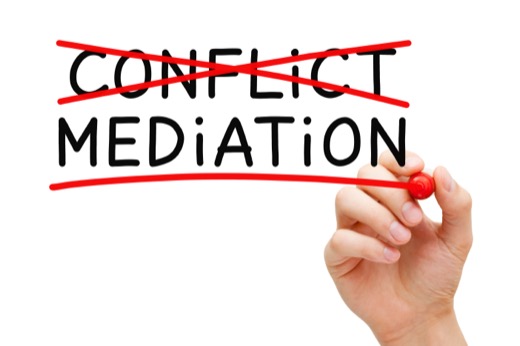- September 26, 2016
- divorce lawyer in greenville sc, greenville sc divorce attorney, greenville sc family law attorney, upstate family law lawyer
Mediation is a form of alternative dispute resolution. Mediation is different from arbitration (another form of dispute resolution) that people may be familiar with. Arbitration is a binding contract, enforceable in court. In arbitration both sides present their case to a neutral party, the arbiter, who then decides the outcome of the issue(s). Mediation is quite different in that (1) it is not a binding resolution enforceable in court, and (2) the mediator is a facilitator in the discussion, rather than a person acting as a judge who will decide the case one way or the other. There are many beneficial aspects to mediation, especially in a family law or divorce case. However, a successful mediator will have the education and experience to be able to understand the issues and contentions of the parties. Additionally, a mediator should not idly stand by to give one party the upper hand in the negotiations – mediation is meant to be a more collaborative process with working through the issues instead of fighting through the issues.
Mediation is a neutral and confidential process where you and your attorney attempt to resolve most of the issues, if not all of the issues, with your spouse (and possibly their attorney) prior to or instead of a divorce trial. The mediator will not take one side or the other or have a personal interest in the outcome of the case. However, the mediator may serve as a “sounding board,” listen to each party, facilitate the discussion, and attempt amicable resolution. Any settlement between you and your spouse with the help of the mediator is voluntary and you don’t lose your rights to go to trial if necessary. Additionally, you may withdraw from mediation at any point. In an effort to reduce the burden on South Carolina courts, parties will be ordered to attend mediation prior to a final hearing. This is a recent development and enforceable as of January 1, 2016. You will only need to attend in good faith but the goal is to resolve as many issues as possible arriving at a mutually acceptable and lasting divorce agreement.
What Are the Benefits of Meditation?
Mediation can be useful to work through common issues. When emotions are high it can be difficult to find common ground. You and your spouse may be stuck or “in the moment” and unable to communicate at all, let alone resolve any issues in a pending divorce. Issues such as alimony, child custody, division of assets, the marital home among others can be contentious issues. Having a neutral-party can begin to open the communicative process. Mediation is also an opportunity to create a tailor-made solution for the parties. There are creative ways to solve problems that exist using mediation rather than through court. Litigation is typically zero-sum, a “win-lose” between you and your spouse. The trial will result in a judge’s order which neither party may be happy with.
What does Divorce Mediation Cost?
Mediating can lead to lower costs. Typically litigation will be a far more expensive endeavour and resolving issues before trial can be beneficial monetarily. Litigation can also lead to years of appeals and a timeline that is not ideal for either party. A divorce trial, custody hearings, and continually fighting in court can drag the process on, not allowing you a “fresh start.” Furthermore mediation lets you control the process. By having the mediator create a framework and timeline you have an opportunity to work through the issues. The mediator will typically listen to each party separately to hear and understand their concerns. The mediator then facilitates discussion and can work through “middle-ground” or agreed upon issues first before tackling the more difficult ones. By understanding the competing interests of you and your spouse the mediator has an opportunity to keep you and your spouse focused on the issues at hand and “unstick” you if there is a breakdown in communicating or roadblock. Additionally, if children are involved, it can be beneficial to cooperate and “work through” issues, even if there is serious disagreement, than “fighting them” in court.
Image Credit: fizkes/ Shutterstock
How Does Meditation Work?
As mentioned, you and your attorney will meet with the mediator and begin to create a framework to help with discussing the issues with your spouse. The mediator in conjunction with the attorneys will attempt to explain how the law views each individual issue in the divorce proceeding. Your attorney should attend the mediation session with you in order to give you proper and unfiltered advice. A mediator may not give legal advice but it will be helpful to have an attorney to negotiate and advise when there may be a better solution. If you are in a no-win situation if a particular issue went to trial there is the potential to negotiate a better outcome or a “this for that” attitude with the mediator and the other party to have a win-win situation.
In a successful mediation the mediator will usually draft the agreement while the attorneys formalize it to submit to the judge. The family court will then incorporate that agreement into a Final Judgment and Decree of Divorce. Absent unusual circumstances, once you agree to the mediator’s draft and sign it the judge will usually enforce it at the end of the process.
Call Robert Clark – Your Trusted Family Law Lawyer – Today
Keep in mind that you don’t have to agree with everything that your spouse is requesting or the mediation in general. However, you should rely on your lawyer to help you handle the situation in a way that will not compromise your position and to “get through the issues.” As discussed, there are many beneficial aspects of mediation and could help you resolve issues rather than fight them. When you are ready to divorce, call Robert Clark, Attorney at Law, as soon as possible so that you can begin the process immediately and decide if mediation is a course of action that may be beneficial in your situation. Contact Robert Clark today for trusted Greenville family law legal guidance that you can rely on.










